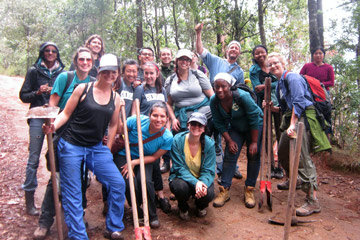Guatemala is ‘alternative’ destination for students’ service project
QUETZALTENANGO, Guatemala – Shortly after the spring semester ended, a group of 15 CU Denver undergraduate students and four staff members headed to Guatemala for the first international Alternative Break.
“The goal of our Alternative Breaks is to get students out of their comfort zones and work with issues concerning social justice and cultural immersion,” said Susanne Lederer, Office of Student Life. “Previous alternative breaks at U.S. locations have focused on issues such as homelessness, education, public health, poverty, rebuilding and sustainability."
The latest group spent most its time in Quetzaltenango – Guatemala’s second-largest city, located at 7,600 feet about three hours from the capitol city. Students participated in three service projects coordinated from there and the language school -- about an eight-minute walk from the hostel where they were staying.
The projects that students worked on included: teaching English at a school in Zunil; reforestation in Paxtuca with ProJuve, where 1,000 trees were planted in two days; and building stoves with Asociacion de Mujeres del Altiplano (AMA), for which students were split into groups of three to build six stoves in two days.
As their time there neared an end, the group headed to Antigua. “We stopped in Santa Lucia, where we were invited by two Mayan elders to attend a Mayan Fire Ceremony,” Lederer said. “This was a very special invitation and we felt very honored to attend this event; Don Federico and Faviana travel to educate people on Mayan issues and traditions and to show that Mayans still exist.”
Reflecting on the trip, one student wrote, “This trip was truly humbling and an experience that I will carry with me for the rest of my life.”
Lederer noted that CU Denver and the Anschutz Medical Campus already had some established ties in Guatemala. There is a study abroad trip as well as students from the medical campus going to take medical Spanish lessons.
Lederer also credits the overall success of the trip to staff from different campus departments coming together. “The Alternative Break trip was facilitated with help from John Sunnygard (Global Education) and Joe Halter (Studentlife), who originally started working on this together with Nelson Rodriguez (who really shaped this trip by communicating extensively with our liaison in Quetzaltenango). Also, Kyle Danforth from academic advising and Meghan from the Office of Global Education were such valuable staff members as they were able to share resources with the students and educate them on existing programs that would add to their learning experience at CU Denver.
“Hopefully we can continue this program and increase our work with the communities in Guatemala who have been so generous and welcoming,” Lederer added. “We highly encourage any student to participate in our Alternative Break program.”


